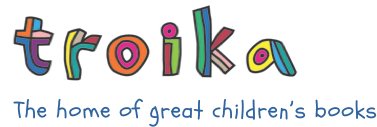‘Day of the Whale’ author Rachel Delahaye on why children (and adults) should never stop asking questions
On 28th April, Troika will publish Day of the Whale by Rachel Delahaye, an exciting new novel for readers aged 10+. The book is set in the future and the action plays out on a fictional island called Cetacea, located where Australia used to be. Why ‘used to be’? Because the world has flooded.
The island is watched over by whales, and all of the island’s people follow Big Blue, the giant whale-god. So you’d be forgiven for thinking that this is a book about whales.
“This book is about asking questions“
“It is and it isn’t,” says author Rachel. “Of course the title is Day of the Whale and whales loom large in the story. But really, this book is about asking questions. It's about the importance of asking questions, and about how life can change when we refuse to stop asking questions.”
“Like it or not, we live in an age of misinformation. Today, the old adage ‘don’t believe everything you read’ is more relevant than ever. And, with deepfake synthetic media and sophisticated computer-generated imagery (CGI), we should also add ‘don’t believe everything you see’. Then of course there’s also ‘don’t believe everything you’re told’, including by sources that would once have been considered reputable, given today’s prevalence of populism and propaganda. So what’s the antidote? One possible approach is to champion critical thinking. As a parent, I’m beginning to think that this is possibly one of the greatest gifts we can give to our children, and indeed to the world.
“…if he asks questions, this will anger those in charge”
“I’m not subtle in making this point in Day of the Whale. There’s talk of rebuilding an intelligent society, with wise old characters instructing younger ones to “fill your head with questions, or others will fill it with lies”. Obscuration of the truth is a key part of the book’s plot. During the adventure, the main character, Cam, unearths some disturbing facts about life on Cetacea. These things pique his curiosity, but he’s been told in no uncertain terms that if he asks questions, this will anger those in charge. For Cam, this triggers as internal struggle. He wants to be loyal to his guardians but at the same time he’s becoming increasingly aware of a number of smoke-screens. His sense of conflict builds and builds until eventually he realises that he needs to risk the wrath of the masters and find within himself the courage to apply inquisitiveness and logic, and to go after the truth.
“Of course there’s plenty more to explore in the story – there’s high-stakes adventure and several other key themes, from friendship to climate change.
“But I’m not at all squeamish about drumming that critical thinking message home. Because children should be asking questions. As a parent to children who subjected me to years of the ‘why, why, why’ torture, I never thought I’d be saying this with such enthusiasm, but it’s true! Unfortunately, in today’s world, if children learn to simply accept what they read, see and hear, then the world is in trouble and our young people risk losing all agency within it.
The instinct to keep asking ‘why’
“’Why?’ is potentially one of the most powerful words we have, as it’s a word that often signals curiosity and can open up a sense of possibility. Children’s authors and storytellers are in a position of privilege here, because we can use the power of story to model and teach the instinct to keep asking ‘why’. We can craft stories that are filled with unexpected twists and turns; we can feature characters who are complex and who have their flaws; we can invent societies that mirror back to us the impact of unfairness and exploitation in our societies; and we can carefully create scenarios that expose both the best and the worst of human nature. In short, stories that not only engage and entertain our young people, but that also make them really think.
“It’s not that I want children to learn to distrust the reality around them. Let’s face it, life’s hard enough, and it’s equally important that children feel a sense of safety. What I’m hoping to do is to encourage them to poke at the surface of things a little, to see what things are made of, check that they make sense and have integrity.”
You can judge for yourself on 28th April, when Day of the Whale is published. Here’s a trailer to whet your appetite.
Launch event on 5th May
If you’re in the Bath area on Thursday 5th May, please join us at Mr B’s Emporium bookshop, at 6.30pm, for the book’s first launch event. RSVP to Ry Johnson kidglovesbooks@gmail.com

